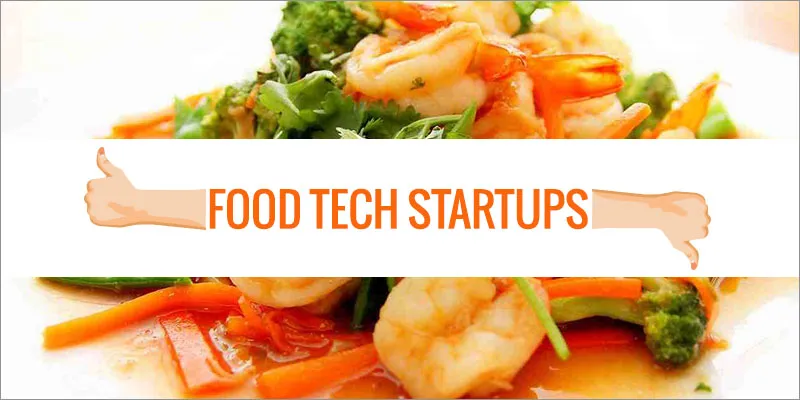Foodtech startups - the one big thing that everyone seems to be missing
There is a lot of hype in the market today about foodtech companies. Regrettably, all the hype that is circulating is due to the negative stories labelling the industry as a sinking ship.
Reasons like downsizing staff, shrinking operations or even shutting down an entire enterprise have added to the negativity.

The foodtech space itself was no less challenging and noisy earlier and these recent news are further adding fuel to the fire.
The most unfortunate part is that people have started concluding that foodtech space is in a bubble and there seems to be an imminent burst, when the reality is that this billion dollar space has not even taken off till now.
Almost every company that has been even remotely associated with food is termed as a foodtech company.
For instance, marketplaces like Foodpanda, Swiggy, and TinyOwl are nothing but an online marketing platform for restaurants, they have nothing to do with the food which reaches a customer.
Shouldn’t Swiggy ideally be termed as a delivery or logistics company which operates in the food industry? Or for that matter, won’t Foodpanda and Tiny Owl be categorized as a tech-based marketing firm operating in the food space?
In fact, the term ‘foodtech’ has become so widely misused that a weight management company is also labelled as foodtech just because the company suggests what food to eat and what not to for reducing weight.
How can you label a company as foodtech which has nothing to do with food making/production?
Nevertheless, the issue is not in labelling all these companies as foodtech, but in marking failure of these models as failure of foodtech.
It's not that there hasn't been any failure in foodtech space. Spoonjoy had to shut down, Dazo closed their operations and there might be a few smaller ones which we don't know about.
However, none of these add to the fact that the foodtech space has saturated or is going down the spiral completely.
There have been fundamental flaws in each of these failing companies and if these shortcomings exist in any business, they can't survive regardless of whether it's in foodtech space or any other space.
Let's look at some of the basic business metrics of these businesses and you would realize what went wrong.
#1. Marketplaces like Foodpanda/Tinyowl make 10 percent commission on order value. With average order value of even Rs 250, they earn only Rs 25 per order. Now consider their costs:
- Cost of customer acquisition: Rs.300 (with discounting that they shower, it further goes up)
- Customer support cost: Rs.20 per order (their support cost is very high because they get huge numbers of calls from customers to know their order status. As they don't own delivery, they don't have the right answers, which means more calls from same customer).
This means, for every order that they generate, they earn Rs.25 while spending Rs.320 on it. As they keep giving discounts to get repeat orders, their customer acquisition cost never comes down which means even if a customer orders 10 times per month, they don't make money.
How can a business with such bad unit economics ever become profitable or survive without continuous funding?
#2. Foodtech companies specializing in on-demand delivery of daily meals, for example SpoonJoy, sell food at average order value of Rs.100. Now let's look at their unit economics:
- Cost of food: Rs 30 (if the menu is changing daily, their wastage will be very high which will further increase this cost).
- Cost of delivery: Rs 80 (this will come down to Rs 50 once delivery is very well optimized at steady state which did not exist in early days. When the company is scaling up this cost will be anywhere between Rs 80 and Rs 100 because they won't have scale to justify the salary of delivery boys).
- Packaging cost: Rs.20
Note that we haven't even included the cost of customer acquisition and we're looking at revenue of Rs100 and cost of Rs130.
Unless we re-work the business model and cut down on delivery/packaging costs, there is no way this model can be profitable.
So does it mean that one can't make a profitable business in the foodtech space?
Truth can't be far from this.
It can be done by doing just one thing: by focusing on what problem you want to solve and creating a viable business model around it keeping unit economics in mind.
You need to be sure whether you want to solve the daily meal problem of a customer or you want to solve an on-demand need of a customer.
Defining this one problem in particular can make all the difference.
Let me explain further by suggesting how to build the right foodtech business by focusing on one of the customer problems.
A) Daily meal problem
Here you would like to serve the need of people who want to order food for their daily meal needs. There are two main pain points of these customers:
- i) Low price point - they want something below Rs 100
- ii) Variety in taste - they don't want to eat same tasting food again and again
Customer doesn't need excellent packaging experience here or on-demand delivery.
So in this case, you should just focus on delivering low-cost food which changes in taste daily and you shouldn't start delivering food in fancy boxes (saving you at least Rs 10 on every order) because someone else is doing this.
You also need to avoid on-demand orders and focus on clubbing multiple orders for delivery either by asking customer to pre-book or subscribe for the meal (this can drastically cut down your delivery costs to below Rs 10 per order making the unit economics viable).
B) On-demand needs
If you're trying to serve the on-demand need of customer (say customer wants to order for a meeting, occasion or wants to eat different/special), then you must work on delivering:
- i) Excellent experience (which includes ordering, packaging, and delivery time).
- ii) Great taste with consistency (contrary to daily meal segment, customer won't like surprises here. She would like the taste to be exactly/closely similar to what it tasted when she ordered last time).
iii) On-demand delivery. You must deliver fast when a customer demands it and shouldn't expect customer to pre-book or subscribe the food.
For such cases, a customer will be willing to spend Rs 200 or more (leaving you with decent positive margin) if you do a good job in terms of all the above.
Now achieving all of above is not easy, and I can say this because this is what we’re trying to build at Petoo.
It takes a lot to deliver great taste consistently at scale and requires massive optimization of delivery system and never-ending effort to deliver the wow experience to customers.
But doesn’t this sound like a great solution to the criticism the foodtech space has recently attracted?
Things become a lot simpler when one knows exactly what they are trying to solve and not lose their focus when the tides near the shore seem topsy-turvy.
The foodtech industry is a multi-billion dollar market in India and there is no right time than now to venture into this space. It is not even close to saturation or hitting the ceiling.
In fact, there is no better time than now to even invest in this space if you trust that the business model is right, unit economics work, and the team has what it takes to pull it off.
The food delivery market has just started to expand and in just the next few years there will be at least five unicorns in this mammoth foodtech space. All it will take is a clear focus on execution without worrying about what everyone is saying now.
About the Author:








